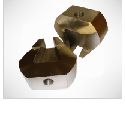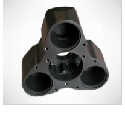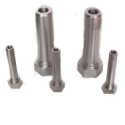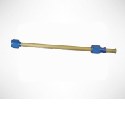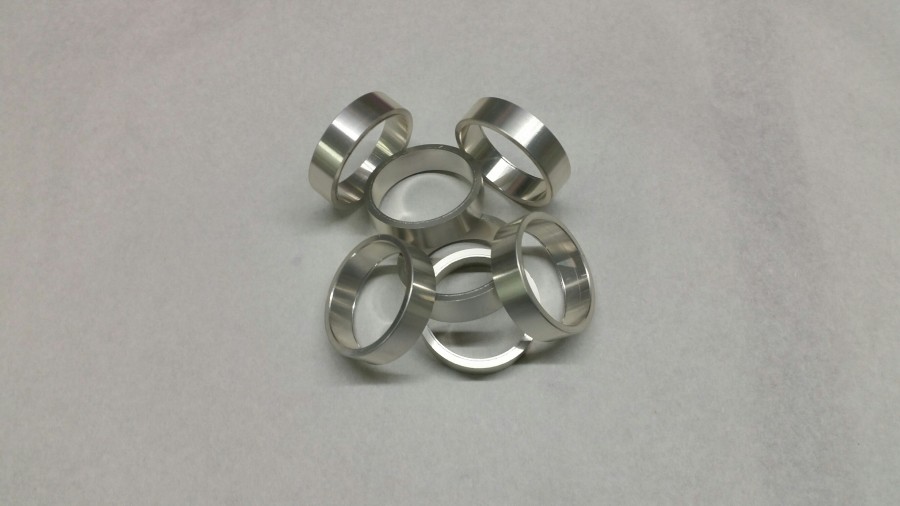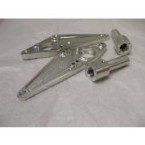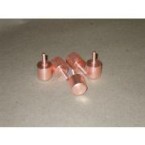Macro Developments (Portsmouth) Ltd
Macro Developments specialises is plating for specific requirements. The benefits are that we will take on any size job requirements and our attention to detail means that we are very well know within the industry.
- Specialised and Selective Plating
- Hard Anodising
- Black Nickel
- Electroless Nickel
- Chromating
- Black Finishes
- Nickel, Tin, Zinc, Copper Plating
There are great benefits to you, as a customer, in choosing Macro Developments
- No Minimum Order
- ISO9001 : 2015 Quality Assured
- MOD Authorised
- Fast & Efficient Service
- 30yrs of Experience
Our applications can be used in a variety of industries and over the years we've developed the catch phrase, 'No Job too Strange!'
We've worked with Aviation to the Telecommunications companies and have plated everything from jewellery to novelty gifts.
Whatever you need, we can help. Visit our website today to find out more
-
Black Nickel can be plated onto any metal and produces a thin jet black finish. It is suitable for applications that require a non reflective surface
-
The thickness of the coating is less than 3 microns so if corrosive protection is required an undercoat of Zinc or Nickel plating will be necessary
-
Black nickel plating results in a dense black finish onto any metal - it is ideal for parts where a non-reflective surface is required.
Filter products and services
-
Copper Plating
Copper is suitable for plating steel, and zinc die-castings, as an undercoat or as a final finish. It can also be used as a high speed process achieving thickness of 50-75 microns per hour. Very good for industrial purposes, such as pipes, brackets, plates and cases.
Request a Quote Supplied by Macro Developments (Portsmouth) Ltd -
Copper plating conductive properties.
Copper plating has such good thermal conductive and malleability properties it is widely used in the heating and the electrical industry. Uses include circuit boards, fasteners and contacts.Request a Quote Supplied by Macro Developments (Portsmouth) Ltd -
Copper Plating heat treatment
Copper plating is sometimes used for steel parts that are to be heatreated. The parts are plated, then the areas that require heat treatment are machined to remove the copper plating. The uses include castings and shafts, and is used extensively in the engineering industry.
Request a Quote Supplied by Macro Developments (Portsmouth) Ltd -
Corrosion Resistance
We have a number of processes for different substrates that offer excellent corrosion resistance.
Request a Quote Supplied by Macro Developments (Portsmouth) Ltd -
Electroless Nickel
Electro-less Nickel is a process which deposits hard, smooth corrosion resistant coatings by chemical reduction.
It is generally used as a fast plating process for Engineering applications, e.g. pumps, gears, pistons and rollers etc.
Electroless Nickel can produce uniform coatings over complex shapes or where there are tight tolerances to work with.
The hardness of Electroless Nickel as plated is approximately 500 VPN but can be increased to values as high as 900-1000 VPN by heat treatment.
Deposits of up to 80 microns can be achieved.
Electroless Nickel is also available in a Black Finish.Request a Quote Supplied by Macro Developments (Portsmouth) Ltd -
Electroless Nickel corrosion properties.
Electroless Nickel is widely used in the gas and oil industry because it unifiromly plates on valves and pipes inside and out, with thickness's of up to 50 microns, because it is a free flowing solution it is ideal for getting into recessed areas where normal electroplating wouldn't be unable to, such as pipes, cylinders and tools.
Request a Quote Supplied by Macro Developments (Portsmouth) Ltd -
Electroless Nickel decorative properties.
Electroless Nickel has good cosmetic properties and depending on the condition of the substrate, can be matt, semi-bright or bright. It id used for name plates, trophies, light switches,
Request a Quote Supplied by Macro Developments (Portsmouth) Ltd -
Electroless Nickel hardness properties.
Electroless Nickel is very hard when plated at about 500 vpn, but can be heated to a hardness of aroud 900-1000 vpn, making it suitable for repairing worn parts such as gears and bearings. Electroless Nickel is used greatly in general engineering.
Request a Quote Supplied by Macro Developments (Portsmouth) Ltd -
Hard Anodising
Hard Anodising is an electrolytic process used to increase the thickness of the natural oxide film on the surface of Aluminium and its Alloys and produces a very hard corrosion resistant insulated surface.
Anodising thicknesses can range from 25 microns to 75 microns depending on the Alloy being processed.
The colour can vary from light to dark grey depending on thickness with the option of being dyed black, other colours can be made available upon request. We can mask off areas where Anodising is not required.
A secure contact point is required due to the current needed to produce the Hard Anodised coating.Request a Quote Supplied by Macro Developments (Portsmouth) Ltd -
Hard Anodising for corrosion resistance
Hard anodising for the purpose of corrosion resistance, is the process of increasing the thickness of the naturally occurring oxide film on aluminium, and is ideal for anything that is outside and affected by the elements, ie: boat pulleys, anntenna stands, grips, aluminium casings. This ideally suited for the marine industry.
Request a Quote Supplied by Macro Developments (Portsmouth) Ltd


